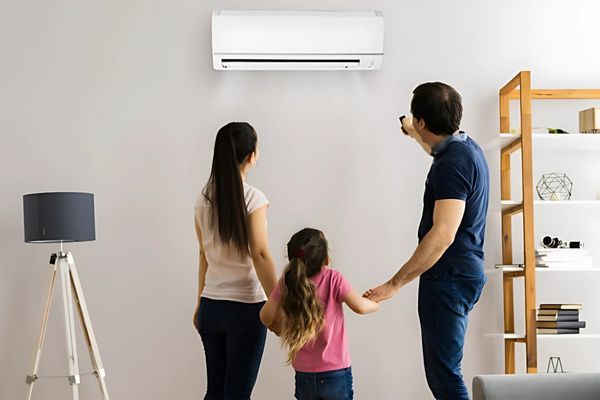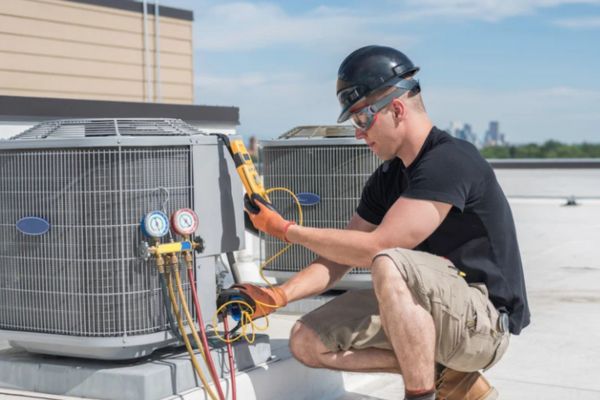An air conditioner replacement is a smart way to drastically increase your home’s comfort and energy efficiency. However, installing a new AC unit can be a significant expense. So, how do you ensure your project stays within budget and doesn’t break the bank? The answer lies in understanding the various cost factors and planning accordingly.
Replacing your AC isn’t just about improving comfort—it’s about saving money in the long run through energy efficiency. With proper planning, you can ensure this project is a sound investment for your home.

Basic Costs of Air Conditioning Replacement
Before starting this project, it’s essential to understand the basic costs involved. The total cost of an air conditioning replacement usually ranges from $3,500 to $7,525, including both the unit and the installation.
Here are some factors that will influence the final cost:
- Square Footage: When your HVAC contractor assesses your property, one of the first things they will check is the square footage. Larger homes need larger, more powerful units, which means a higher cost.
- Repairs: To optimize the system’s efficiency, your contractor may suggest additional repairs, like improving insulation or resealing windows. These added tasks can contribute to the total cost.
- The Unit: Energy-efficient units often have a higher price tag, but they can save you money on energy bills over time. Units with high Seasonal Energy Efficiency Ratio (SEER) ratings will help reduce long-term operational costs.
- Labor: Labor costs vary based on the project’s scope, crew size, and contractor’s expertise. Choosing the right contractor is crucial to ensuring quality work.
- Permitting: Depending on local regulations, your contractor might need to secure permits for the installation, which can add to your costs. Permit fees may vary depending on your location and property size.
Common Unexpected Expenses
Even if you’ve carefully planned your budget, surprises can happen during any home improvement project, especially with older homes. Being prepared for these potential costs will save you stress down the road.
Here are some everyday unexpected expenses:
- Replacing Damaged Ductwork: If your home’s ducts are old or damaged, they must be replaced to maintain air quality and system efficiency. Damaged ductwork can lead to energy loss, raising your monthly bills.
- Rotten Wall Studs: Sometimes, contractors discover that moisture has damaged wall studs behind your AC unit, particularly in basements or crawl spaces. Repairing this can increase costs.
- Electrical Upgrades: Older homes often don’t have the electrical capacity to support modern HVAC systems. Sometimes, you’ll need to upgrade your home’s electrical panel, which can add to your project’s price.
- Drywall Repairs: If the installation requires new ducts or repositioning the unit, you might need to repair or replace drywall to make room for the new system. This can increase labor and material costs.
Keeping Your Air Conditioning Replacement on Budget
Planning for potential cost overruns when embarking on a project like this is always a good idea. A few key strategies can help you stay on budget, even when surprises pop up.
- Timing is Key: Schedule your AC replacement during the off-season, like fall or spring, when contractors are less busy. You may get a discount on labor and supplies.
- Build in a Buffer: Plan to leave 15-20% wiggle room in your budget. This extra cushion will help you absorb unexpected expenses without derailing the project.
- Communication is Crucial: Be transparent with your contractor about your budget. This will ensure they don’t suggest upgrades or extras that could push you beyond your financial comfort zone. Clear communication can prevent unpleasant surprises later on.+
Partner with a Reliable Contractor
Air conditioning replacement is a complex project, but it doesn’t have to be overwhelming. Proper planning allows you to stay within budget while upgrading your home’s comfort and energy efficiency. One of the best ways to ensure success is by partnering with a reputable, experienced contractor.
A good contractor will not only guide you through the installation process but also help you identify potential issues before they become costly problems. Take the time to do your research and find a trustworthy and experienced contractor so you can enjoy a stress-free project and a cool, comfortable home for years to come.


